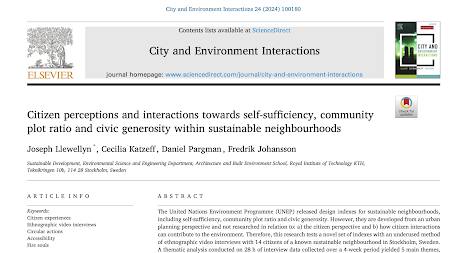.
Me and my colleague Elina Eriksson started a new course this week, "Teaching and Learning for Challenge Driven Education in a Global Context" (LH233V) - a pedagogical course for teachers that is given by a friend our ours, Anders Rosén. While the course is given by our university and a large majority of the participants are teachers at KTH, some come form other universities in the Stockholm area (e.g. Stockholm University and Karolinska Institute), but also from different universities in Africa, e.g. Strathmore University (Kenya), University of Eswatini (Eswatini - formerly known as Swaziland) and Botho University (Botswana).
"Challenge-driven" implies that students will work with real-world challenges rather than "toy problems" that are chosen just for them to learn something (but possibly with few real-world implications). The course stresses collaborative learning an co-creation and thus fits well with what we do in our new master's programme in Sustainable Digitalisation.
We have in fact planned to give a larger (15 ECTS) challenge-driven project course in our programme during the third term and taking this pedagogical course is our way of learning more about challenge-driven education while simultaneously developing our course. Our course is called "Transformative Change in Complex Systems" (DM2803) and it will be given at 50% pace throughout this coming autumn term (August - December) and this is the short version of what students will do in our course:
"In this challenge driven project course, students will get the possibility to analyse and handle “wicked”, complex sustainability problems in collaboration with the surrounding society. The students learn to identify and analyse needs, challenges and goal conflicts and to design interventions that intend to achieve change. The projects will be based on sustainability-related problems that stakeholders in the surrounding society have formulated. In the course students also get to evaluate interventions, to ensure they favour the society in general, organisations, individuals, other species and whole ecosystems locally as well as globally, in the short and long term. The students will also be given tools to lead trans-disciplinary co-creative processes, where also transformative learning can be identified and developed."
So our project course exists "on paper", but we need to develop it and fill the DM2803 "container" with content - and that's the project we will work on during the spring as we take the KTH course for teachers. It's all very nifty.
But back to the pedagogical course we are taking, LH233V. That a course is "challenge-driven" means that it is far away from the traditional "conduit metaphor" where the job of the teacher is to "package" and "transmit" knowledge to the student. Challenge-driven courses instead start with a case - a complex real-world problem that is open-ended (has no one right solution), and project outcomes and learning outcomes are equally important, where "project outcomes" can lead to change in society and "learning outcomes" can lead to change in people.
The course also emphasises complex, "wicked problems" and sustainability, both which fit us well very and where traditional engineering education instead usually only address complicated problems (and might in fact reduce complex problems into complicated problems to make them addressable (thereby missing out on the complexity and messiness of the real world at the risk of making the solution partial and irrelevant).
Building on a paper by Sterling (2011), "Transformative Learning and Sustainability", there was an interesting image that stated that traditional (engineering) education usually addresses only 1st order change/learning, e.g. doing things better in terms of effectiveness, efficiency and optimisation. Addressing 2nd order change/learning also examines and changes norms and assumptions and 3rd order change/learning also has the potential to challenge and change values, beliefs and worldviews. Challenge-driven education thus has the potential to address the need for transformative systemic change in society. Discussing challenges of car society, 1st order solutions might emphasise driverless or electric cars to make travel more efficient and less polluting. 2nd order change might instead emphasise car manufacturers taking responsibility for the whole lifecycle of a car, alternatives to car-centric city planning and improved public transport while 3rd order (paradigm) change might questions assumptions and come up with suggestions such as prioritising self-powered vehicles (e.g. bicycles) or creating walkable cities that reduces the need for transports.
.















